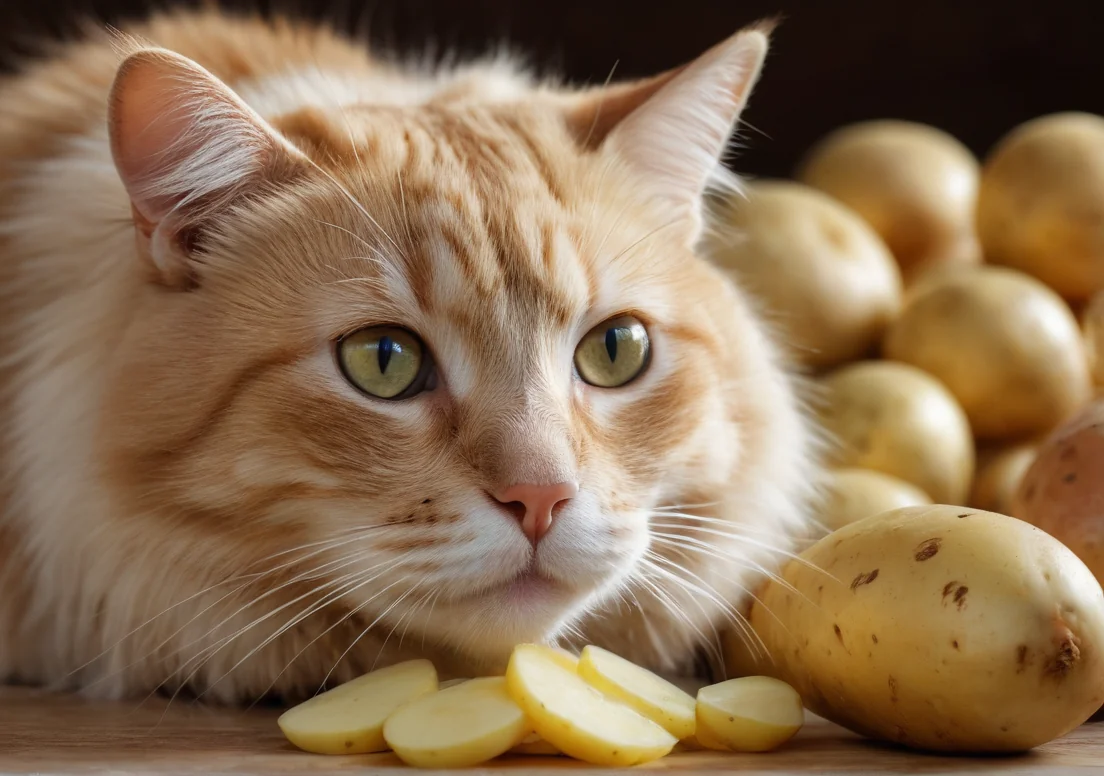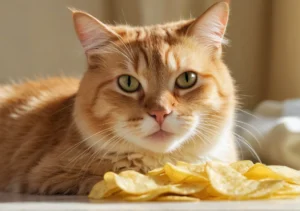Why does your cat have a fascination with potatoes? If your feline friend can’t seem to get enough of these starchy delights, you’re not alone. Many cat owners notice their pets being enamored with this unexpected snack.
Cats are naturally curious creatures, and potatoes intrigue them for various reasons, including texture, smell, and even a desire to play. But hold on—there’s more to this peculiar obsession than meets the eye. Keep reading to uncover the surprising layers behind your cat’s potato passion!

What makes potatoes so appealing to cats
Cats are naturally curious creatures, and their fascination with potatoes can be attributed to a mix of sensory allure. The texture of a potato—smooth, firm, and sometimes a bit wrinkled—might remind them of toys or even prey they’d encounter in the wild. When they paw at or nibble on a potato, they’re engaging their senses in a way that satisfies their instinctual behaviors.
Moreover, the smell of a potato can be quite enticing. While cats have a different olfactory system than humans, they can still pick up on various scents. The earthy aroma of a potato may attract them, especially when it’s cooked. Even the faint scent of a raw potato can spark interest, tempting them to investigate further.
Lastly, let’s not ignore their love to explore. Cats love to play with anything new, and potatoes’ unique presence in your kitchen might be irresistible. It’s not unusual for a little feline to think, “What’s this strange object?” and embark on an exploratory mission.
Do cats actually like the taste of potatoes
Contrary to popular belief, cats aren’t true omnivores; they’re obligate carnivores. This means their diet primarily consists of meat. However, that doesn’t mean they outright dislike the flavor of potatoes.
While some cats show interest in munching on cooked potatoes, it’s essential to be cautious. Potatoes offer limited nutritional value for cats and should not replace their regular diet. They contain carbohydrates and certain vitamins, but felines require protein and specific nutrients they can only get from animal products.
For those curious if it’s safe for cats to nibble on potatoes, the answer is yes, as long as they’re cooked and served plain. Raw potatoes, especially the green parts, contain solanine—a toxic compound that can harm cats.
Here’s a quick list of important points about potatoes and cats:
– Safe only when cooked: Always avoid raw potatoes.
– Moderation is key: If your cat shows interest, limit quantities.
– Watch for allergies: Introduce any new food slowly to observe reactions.
– Nutritional needs: Prioritize a diet based on animal protein.
If you’re ever in doubt about what’s safe for your pet, the ASPCA provides a comprehensive list of foods that are safe or toxic to cats here.
Could it be a playful behavior
Cats are naturally curious and playful creatures, often treating everyday objects as their personal toys. It’s not uncommon for them to latch onto something unexpected, like potatoes. The texture and shape of a potato can intrigue your kitty, making it a fun target for pawing, batting, or even chasing.
Cats enjoy the sensation of rolling and pouncing, which is exactly what a potato can offer. Its round shape invites your feline friend to practice their hunting skills, imitating the chase as they might with a more typical toy or even a bug.
Some signs that your cat is engaging playfully with potatoes:
- Pouncing – If your cat is leaping towards the potato like it’s caught something, that’s a clear sign of play.
- Biting or Chewing – A little nibble here and there might mean they’re just exploring their “prey.”
- Batting – Swatting at a potato can be viewed as their playful way of trying to ‘capture’ it.
Next time you see your cat obsessing over a potato, take it as a compliment to their playful side. Just remember to keep an eye on their antics to ensure they don’t get too carried away!
Are potatoes safe for cats to eat
Potatoes can be a bit of a double-edged sword when it comes to your cat’s diet. While a small amount of plain, cooked potato might not cause any harm, there are important safety concerns to consider.
Raw potatoes contain solanine, a toxin that can lead to gastrointestinal upset and even more serious health issues in cats. Even cooked potatoes should be plain; avoid adding butter, seasoning, or other ingredients that can upset your kitty’s stomach.
Here’s a quick checklist for handling potatoes with cats:
- Cooked Only – Make sure they’re thoroughly cooked; raw potatoes are a no-go.
- No Additives – Keep them plain without butter, salt, or spices.
- Small Portions – If you decide to share a bite, keep it minimal to avoid any digestive issues.
- Watch for Reactions – Always be on alert for any signs of discomfort after consumption.
If you’re interested in learning more about feline nutrition, the American Animal Hospital Association is a great resource for understanding what’s safe for your pet. Always prioritize their health by opting for appropriate treats that align with their dietary needs.
What nutrients do cats need from their diet
Cats are obligate carnivores, meaning their diet primarily requires animal-based proteins. While they may turn their noses up at certain foods, an unusual obsession—like their fixation on potatoes—can stem from a few well-reasoned motivations. First off, potatoes carry carbohydrates. While not essential for cats, some might be drawn to the texture or even the starches, especially if they’ve been introduced to them during mealtime.
Additionally, the smell of cooked potatoes might appeal to their instinctual preferences. Not every kitty is seeking nutrients per se; sometimes, it’s about what’s on their plate!
Though relying solely on unconventional items like potatoes isn’t ideal, it’s crucial to remember that a cat’s nutritional needs cover a range of components, including proteins, fats, vitamins, and minerals. Cats don’t just seek variety for fun; their instincts can push them to explore new tastes—even if they aren’t traditional.
Are there alternatives to potatoes for cats
If your feline friend is crazy about potatoes, you might want to explore safer alternatives. Here’s a handy list of options that’ll provide similar textures or tastes without potential hazards:
Sweet Potatoes : Cooked and mashed, they can be more nutritious and provide a sweet taste cats might enjoy.
Pumpkin : Packed with fiber and low in calories, it’s great for digestion and can be a fun treat.
Chickpeas : Mashed, they’re safe and can add a protein boost to their diet.
Carrots : Softened and cut into small pieces can provide crunch without the risks that come with nightshades.
Green Beans : These are low in calories and great for cats that enjoy crunchy snacks.
Keep in mind, while these options can satisfy your kitty’s curiosity, anything outside of a standard cat diet should be offered in moderation. Always consult your vet before making any significant dietary changes. Plus, make sure to introduce these new treats gradually to avoid any tummy troubles.
Fun facts about cats and food preferences
Cats are notoriously finicky eaters, and their strange obsessions can sometimes be baffling. Did you know cats have flavor preferences that are distinctly different from ours? Unlike humans, they’re not drawn to sweet flavors and lack the taste receptors for sugar. Instead, their tastes lean towards savory and umami, which might explain the allure of potatoes when cooked. You might find your kitty oddly fascinated by the texture and warmth of a potato, simulating the appeal of a cozy, furry prey.
Another quirky tidbit is that cats use their sense of smell more than their taste when it comes to food. While they might become infatuated with a harmless spud, it’s likely just the unique scent and texture that’s piquing their curiosity. Just like how we occasionally crave comfort food, your cat may see a potato as a fun, engaging element in their environment.
How to keep your cat entertained
Redirecting that potato fixation can be a creative endeavor. Keeping your cat engaged with a range of stimulating activities is key. Here are some tried-and-true tips to spice things up:
Interactive Toys: Puzzle feeders and toys that dispense treats can keep your cat’s mind sharp and their paws busy.
Cat Trees and Shelves: Elevating your cat’s play area allows them to climb and explore. Cats love vertical spaces, so providing sturdy options can satisfy their natural instincts.
Engaging Play Sessions: Set aside time each day for interactive play. Wand toys, laser pointers, or even simple DIY toys can ignite their hunting instincts.
Rotate Toys: It’s amazing what a little novelty can do! Swap out toys regularly to keep their interest piqued.
Homemade cat treats: Crafting treats (like tuna or chicken-flavored goodies) can draw their attention away from potatoes and onto something tasty!
Bonus Tip: Look into cat enrichment ideas. Sites like The Catnip Times offer extensive resources on environmental enrichment to keep your furry friend entertained, engaged, and away from those pesky potatoes!
What do experts say about unusual cat behaviors
Cats have all sorts of quirky habits, and being drawn to potatoes is one of the more bizarre ones. Experts, including veterinarians and animal behaviorists, offer insights that can shed light on this peculiar potato fascination.
One reason behind this fixation could be scent attraction. Potatoes emit a smell that might intrigue your cat’s sensitive nose. Cats have an incredible olfactory system, and they may associate the scent with something familiar or comforting—perhaps it reminds them of the earthy smells from the outdoors or the scent of human food prep.
Another angle to consider is the texture. Cats love to explore different surfaces, and a potato’s smooth skin can be fun to rub against or bat at. This behavior mimics their instinct to interact with various objects in their environment, treating the potato like a toy or a playmate.
Also, keep in mind that curiosity rules the feline world. If a potato is simply lying around, it can become a focal point for your pet’s exploration. It’s not so much about the potato itself but rather the act of engaging with an interesting item that piques their curiosity.
If your cat’s potato obsession seems excessive or you notice any unusual behavior changes, it’s wise to consult with a veterinarian. They can help you determine if this quirk is just playful fun or a sign of something more serious. For further reading, check out the ASPCA’s resources on unusual pet behavior here.
Alex, a passionate animal lover, has experience in training and understanding animal behavior. As a proud pet parent to two dogs and three cats, he founded AnimalReport.net to share insights from animal experts and expand his knowledge of the animal kingdom.




